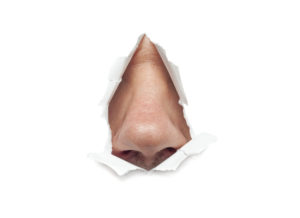 What is a “Deviated Nasal Septum”? If you are a part of the approximately 80% of the population who has one you know exactly what it is.
What is a “Deviated Nasal Septum”? If you are a part of the approximately 80% of the population who has one you know exactly what it is.
Your septum separates the left and right sides of your nose, dividing your nostrils into two airways. When your septum is deviated, crooked, or off-center, it can cause a restriction of the airflow in one or both of your nasal passages.
A deviated septum can go undetected for years before its symptoms become bothersome.
Here are a few signs your septum may be deviated:
- Your sleeping is noisy. Your sleeping buddy says you snore. This can even occur in infants and young children with a deviated septum or with swelling of the intranasal tissues.
- You find it difficult to breathe through your nose. One or both nostrils may be affected, but one side is usually worse than the other. Often, difficulty breathing leads to a preference of sleeping on a particular side, allowing for easier air passage through the nostril that isn’t narrowed. During sleep, you may breathe noisily due to swelling in the nasal tissues. In some cases, a deviated septum can interfere with how your sinuses work, which can lead to nasal congestion and recurrent sinus infections.
- You prefer sleeping on a particular side. If you prefer to sleep on a particular side in order to optimize your breathing through your nose at night, this can be due to your deviated septum narrowing one nasal passage.
- You have lots of nosebleeds. If you have frequent nosebleeds, a deviated septum may be the culprit. With a deviated septum, the membranes in the unobstructed side of your nose are more exposed to the air. This can dry out the surface of your septum, which can lead to bleeding.
- Your face hurts. Facial pain doesn’t always indicate a deviated nasal septum. In some cases, however, a severe deviation can impact your inside nasal wall. When this happens, you may feel pain on the side of the face with the narrowed nostril.
If you would like to learn more, we invite you to call to schedule a consultation appointment to discuss the surgical solution for a deviated septum.




No comments yet.